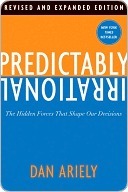More on this book
Community
Kindle Notes & Highlights
by
Dan Ariely
Read between
December 27, 2021 - September 14, 2022
Mark Twain once noted about Tom Sawyer, “Tom had discovered a great law of human action, namely, that in order to make a man covet a thing, it is only necessary to make the thing difficult to attain.”
Perhaps it's time to inventory the imprints and anchors in our own life. Even if they once were completely reasonable, are they still reasonable? Once the old choices are reconsidered, we can open ourselves to new decisions—and the new opportunities of a new day.
If people had no memory of past prices, the consumption of milk and wine would remain essentially the same, as if the prices had not changed. In other words, the sensitivity we show to price changes might in fact be largely a result of our memory for the
prices we have paid in the past and our desire for coherence with our past decisions—not at all a reflection of our true preferences or our level of demand.
when a social norm collides with a market norm, the social norm goes away for a long time. In other words, social relationships are not easy to reestablish. Once the bloom is off the rose—once a social norm is trumped by a market norm—it will rarely return.
PLACEBO COMES FROM the Latin for “I shall please.” The term was used in the fourteenth century to refer to sham mourners who were hired to wail and sob for the deceased at funerals. By 1785 it appeared in the New Medical Dictionary, attached to marginal practices of medicine.
buying a mug for five dollars for an attractive stranger was clearly out of bounds, but buying the same stranger an eight-dollar drink in a bar was very easy to justify.


